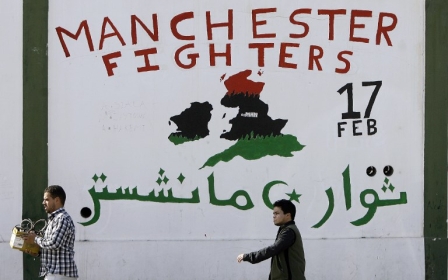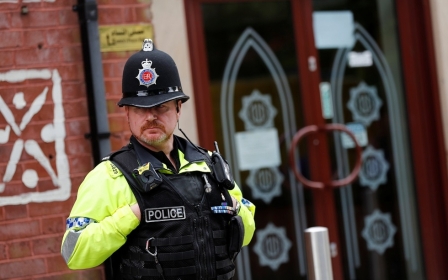Manchester police faced criticism over 'amateurish' Prevent training
Counter-terrorism training material produced by Greater Manchester Police to help people identify potential terrorists was withdrawn last year amid criticism that it was "amateurish, thoughtless and likely to be counter-productive".
Police and security services in the UK are facing questions over their failure to identify Manchester bomber Salman Abedi as a threat, despite reports that members of the local Muslim community called an anti-terrorism hotline to report him as someone of concern.
Home Secretary Amber Rudd has said that Abedi, a 22-year-old who had travelled regularly to and from Libya since the country's 2011 uprising, was known to the intelligence services, raising questions about whether he had any contact with local Prevent officers.
Prevent is the counter-extremism strand of the UK government's counter-terrorism strategy which aims to stop people from being drawn into terrorism. Advocates of Prevent argue that it is a safeguarding exercise providing mentoring and support to vulnerable individuals.
Critics argue that it is discriminatory against Muslims and has undermined community relations and trust in the police and security services.
Warnings ignored
Members of Manchester's Muslim community have raised concerns that police failed to act on information about Abedi that had been passed to them by the public.
Mohammed Shafiq, chief executive of the Manchester-based Ramadhan Foundation, said: "People in the community expressed concerns about the way this man was behaving and reported it in the right way using the right channels.
"They did not hear anything since."
Police in Manchester have been embroiled in a number of counter-terrorism-related PR blunders in recent months.
In May last year, Greater Manchester Police was forced to apologise after staging a suicide bombing training exercise at the Trafford shopping centre in which the mock-attacker had shouted "Allahu Akbar".
The force apologised again in December after MEE revealed that it had produced a mockup of a "terrorism edition" of the board game "Guess Who?" as part of Prevent training material.
The material was subsequently shared with police forces nationwide, local authorities and schools as part of an online "Prevent Cloud", described as a "national tool which brings best practice on Prevent relating to policies, good practice and tools together in one place to enable practitioners from across a range of institutions to understand and deliver Prevent".
When MEE flagged concerns about the material, Greater Manchester Police said it had been delivered on four occasions to army cadet units, a military youth organisation supported by the Ministry of Defence, but had subsequently been withdrawn.
The force also admitted that the creators of the "Guess Who?" presentation had not sought the permission of Hasbro, the toy company that manufactures the game."The developers of the presentation had the best intentions and have now been made aware of how the presentation could be perceived. We apologise if any offence has been caused," Chief Superintendent Tony Mole, the head of the North West Counter Terrorism Unit, told MEE.
Those featured on the "Guess Who?" slide included Germaine Lindsay, one of the four 2005 London suicide bombers, and Shasta Khan and husband Mohammed Sajid Khan, who were described as "Britain’s first married couple to be convicted of terrorist offences".
The couple were jailed in 2012 over a thwarted plot to attack a Jewish community in the northern town of Bury.
Others included Nicky Reilly, who was convicted of attempting to blow up a restaurant in Exeter in 2008; Andrew Ibrahim, who was convicted of plotting to carry out a suicide bombing at a shopping centre in Bristol; and Roshonara Choudhry, who stabbed a member of parliament in 2010.
It also featured David Copeland, a far-right militant jailed for a series of nail bomb attacks in London in 1999, and Sarah Whitehead, a "vegan and retired nurse" jailed in 2010 over a campaign of intimidation targeting staff at an animal testing laboratory.
'Likely to be counter-productive'
Robin Richardson, an educational consultant, told MEE that the "Guess Who?" presentation appeared to be "based on a very superficial and inadequate understanding of the factors that lead to someone committing the kinds of crime that are collectively known as 'terrorism'".
"It appears therefore to confirm the suspicion which many people have that the Prevent programme has not been well planned, is too often amateurish and thoughtless in the ways it is implemented, and is likely to be counter-productive."
Last May's high-profile training exercise at the Trafford Centre, which police described as "based on a suicide attack by an extremist Daesh [Islamic State] style organisation", also backfired for the force. Assistant Chief Constable Garry Sherwan acknowledged that it had been unacceptable to link it to Islam.
Manchester City Council is also among a number of local authorities to introduce Prevent awareness training for taxi drivers, encouraging them to act as the "eyes and ears of the community" and to trust their instincts.
"The nature of your job means you are in contact with people all day long and in some cases for long periods of time. You will know instinctively when someone is acting suspiciously or if something is out of the norm," the handbook says.
It is not known whether Abedi was referred to Prevent or Channel, a deradicalisation scheme run by police and local authorities aimed at young people. Advocates of Prevent argue that engagement with the programme is voluntary.
But Simon Cole, the national police lead for Prevent, told a conference in London earlier this month that anyone who did not engage would likely become a subject of interest to counter-terrorism police.
"A Prevent referral is a voluntary referral. It is not a compulsion. If you do not want to comply or cooperate then you do not have to do so," said Cole, then adding, "If you choose not to, of course that does cause us to question why and you may head into the Pursuit space."
Pursuit is the strand of the UK’s counter-terrorism strategy concerned with stopping attacks by attempting to disrupt the activities of those it suspects of involvement in terrorism-related activities.
Police and members of the emergency services have been praised for their response to Monday night's attack on crowds leaving a pop concert at the Manchester Arena which killed at least 22 people.
"I want to thank the hundreds of police, fire and ambulance staff who worked through the night in the most difficult circumstances imaginable," said Andy Burnham, the Mayor of Greater Manchester.
In its latest statement on the investigation into the bombing, GMP Chief Constable Ian Hopkins said: "We have been overwhelmed by support from members of the public."
New MEE newsletter: Jerusalem Dispatch
Sign up to get the latest insights and analysis on Israel-Palestine, alongside Turkey Unpacked and other MEE newsletters
Middle East Eye delivers independent and unrivalled coverage and analysis of the Middle East, North Africa and beyond. To learn more about republishing this content and the associated fees, please fill out this form. More about MEE can be found here.





